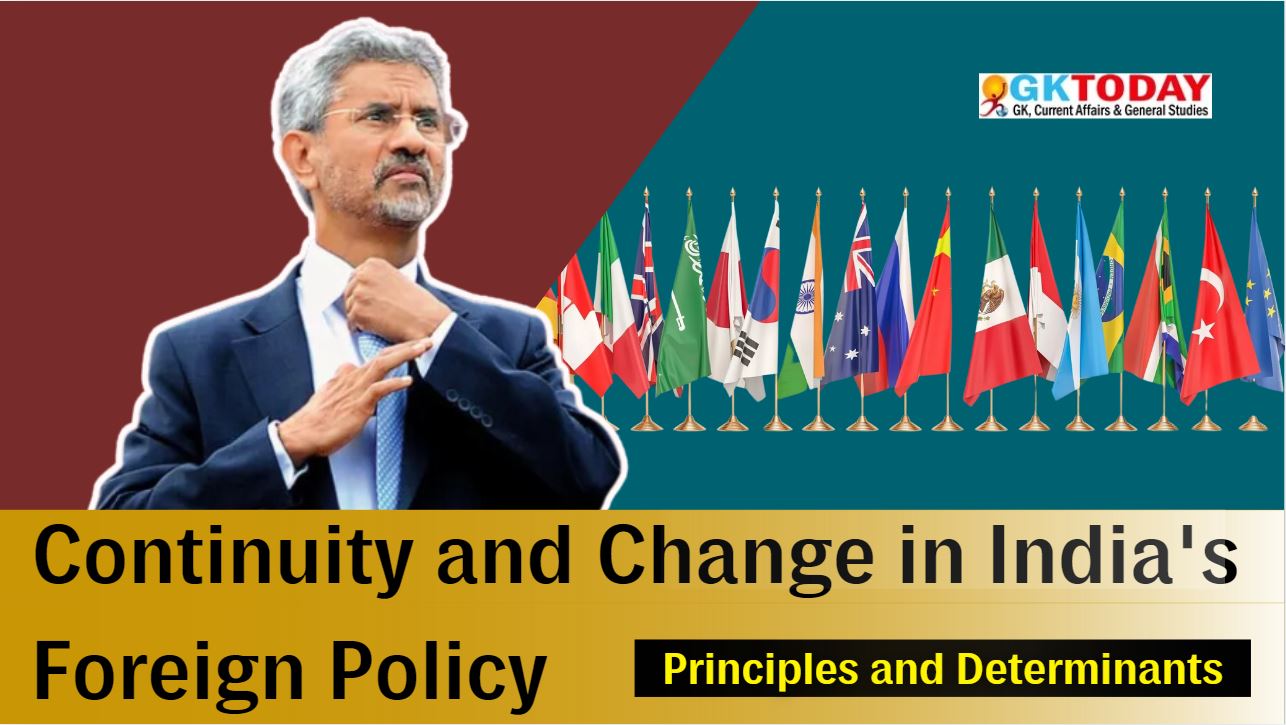India’s Foreign Policy – Continuity and Change in India’s Foreign Policy
India’s foreign policy has undergone changes since independence in 1947. However, certain principles have remained constant, shaping its international relations.
Principles of India’s Foreign Policy
India’s foreign policy is guided by several foundational principles. These principles reflect the country’s historical context and its aspirations on the global stage.
Non-Alignment
– Origin – Non-alignment emerged during the Cold War era. It was a strategic choice to avoid alignment with either the Western or Eastern blocs. – Objective – The aim was to maintain India’s independence in foreign affairs while promoting peace and cooperation among nations. – Key Figures – Prominent leaders such as Jawaharlal Nehru, Sukarno, Josip Broz Tito, and Gamal Abdel Nasser were instrumental in shaping this doctrine.
Panchsheel Principles
– Definition – The Panchsheel principles consist of five tenets of peaceful coexistence. – Core Principles:
- Mutual respect for territorial integrity and sovereignty
- Mutual non-aggression
- Mutual non-interference in internal affairs
- Equality and mutual benefit
- Peaceful coexistence
– Origin – These principles were formulated in 1954 during the India-China agreement, marking diplomatic milestone.
Secularism
– Emphasis – Secularism is very important in guiding India’s foreign relations. It promotes dialogue across diverse religious and cultural backgrounds. – Goal – The aim is to encourage global peace and stability by engaging with nations irrespective of their religious affiliations.
Anti-Colonialism and Anti-Imperialism
– Support for Liberation – India has historically supported liberation movements in colonised nations. – Advocacy – The country champions self-determination and sovereignty for all nations. – Role in NAM – India played a key role in the Non-Aligned Movement (NAM), advocating for the rights of oppressed nations.
Economic Diplomacy
Economic diplomacy has gained prominence in India’s foreign policy, focusing on international cooperation for growth.
Objectives
– Economic Growth – The primary aim is to enhance economic growth through global partnerships. – Trade Agreements – India actively engages in various trade agreements to boost its economy. – Investment Attraction – There is a strong emphasis on attracting foreign investment and facilitating technology transfer.
Strategic Autonomy
India’s foreign policy is marked by a quest for strategic autonomy.
Independence in Policy
– Prioritising National Interests – India seeks to maintain an independent foreign policy that prioritises its national interests. – Balancing Relations – The country balances its relations with major powers like the USA, Russia, and China without formally aligning with any bloc. – Flexible Alliances – India adopts a flexible approach to alliances, adjusting its foreign policy based on situational needs.
Regional Cooperation
India places importance on regional cooperation to enhance stability and integration.
Initiatives
– SAARC – The South Asian Association for Regional Cooperation aims to promote economic and regional integration among South Asian countries. – BIMSTEC – The Bay of Bengal Initiative for Multi-Sectoral Technical and Economic Cooperation focuses on enhancing connectivity and cooperation among member states. – Goals – These initiatives are designed to strengthen ties with neighbouring countries and promote regional stability.
Global Governance and Multilateralism
India actively participates in global governance and multilateral institutions.
Participation in International Organisations
– Key Bodies – India is a member of various international organisations, including the United Nations (UN), World Trade Organization (WTO), and G20. – Advocacy for Reforms – India advocates for reforms in global governance structures to reflect contemporary realities. – Addressing Global Challenges – The country is committed to tackling global issues such as climate change, terrorism, and pandemics.
Soft Power
India utilises soft power to enhance its global image and influence.
Cultural Diplomacy
– Promotion of Culture – India promotes its culture, values, and traditions through initiatives like the Indian Council for Cultural Relations (ICCR). – People-to-People Connections – Engagement with the diaspora and cultural exchanges encourage mutual understanding and goodwill.
Security and Defence
National security and defence are crucial components of India’s foreign policy.
Focus Areas
– Defence Capabilities – India prioritises strengthening its national security and defence capabilities. – Strategic Alliances – The country engages in defence partnerships and strategic alliances, exemplified by the QUAD initiative. – Counter-Terrorism – There is a strong emphasis on counter-terrorism and maritime security to protect national interests.
Environmental Diplomacy
India’s commitment to environmental issues is reflected in its foreign policy.
Sustainable Development
– Environmental Protection – The country is dedicated to sustainable development and protecting the environment. – International Agreements – India actively participates in international environmental agreements, including the Paris Agreement. – Climate Justice – The nation advocates for climate justice, supporting developing countries in addressing environmental challenges.
Human Rights and Humanitarianism
Human rights are a core aspect of India’s foreign policy.
Core Principles
– Promotion of Human Rights – India promotes human rights in its international engagements. – Humanitarian Interventions – The country supports humanitarian interventions and disaster relief efforts globally. – Engagement in Forums – India actively participates in international human rights forums and treaties.
Summary of Key Themes
India’s foreign policy reflects both continuity and change.
Continuity
– Foundational Principles – Non-alignment, Panchsheel, anti-colonialism, and secularism remain integral to India’s foreign policy framework.
Change
– Evolving Focus – There is an increased emphasis on economic diplomacy, strategic autonomy, and soft power in response to shifting global dynamics. India’s foreign policy continues to evolve while adhering to its foundational principles. The balance between continuity and change enables India to navigate complex international landscapes effectively.


